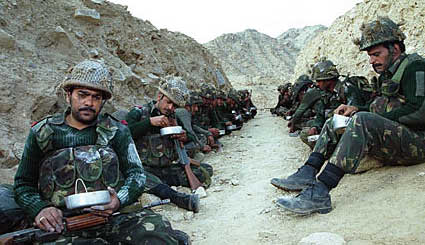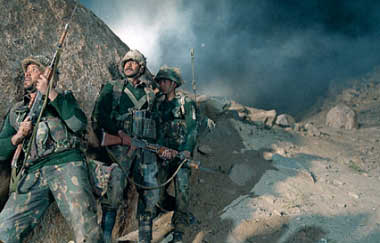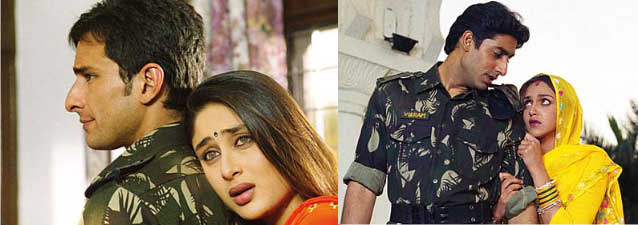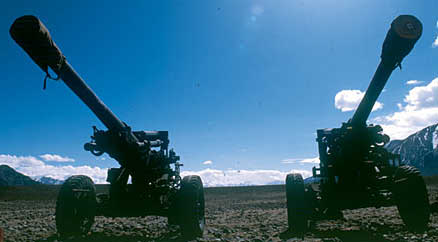

The long-term antagonisms between India and Pakistan over claims to Kashmir came to a violent flashpoint in May of 1999 when over 1,000 intruders crossed the Line of Control (LOC) that divides Pakistani held Kashmir and Indian held Kashmir (Kargil). These intruders – a combination of Muslim Taliban and Pakistani soldiers (unofficially) – occupied the rocky heights that overlooked the main road that connects some of the vital areas in the province. Over the next two months India slowly drove out the intruders with fierce close up combat, but made a point of never crossing the LOC into Pakistani held territory. In July, the intruders withdrew, but some 400 Indian troops had been killed during the confrontation.

This film from writer/producer/director J.P. Dutta is an attempt to honor those fallen Indian soldiers. With a large budget and a collection of some of India’s biggest stars, the film is a four-hour telling of the conflict with a special focus on some seven soldiers and the women they left behind. From an Indian perspective and perhaps through the prism of national pride and Pakistani animosity, this is possibly a very moving film that throws the audience tons of red meat to gnaw on, but from an objective non-Indian cinematic point of view the film is quite tedious and unimaginative – by the end it feels as if a lead weight has been dropped on top of you. The four-hour running time felt more like four days – I should have brought a sleeping bag and rations to get through this endurance test. There is so much wrong with it that I barely know where to begin. But I feel somewhat guilty in bashing a film that is a tribute to true heroes – all the main characters are based on real people in the war – many of whom died – but again from a strictly cinematic perspective this is not a well-made film. Though in a sense that was perhaps not of paramount importance to the director – he perhaps had another agenda – and certainly the approving critical opinions of Westerners was not the in the least bit of import to him.

I thought war films like this went out of style with the American film The Green Berets (1968). LOC is so mired in ultra unfettered totally biased nationalism that it comes across as more of a propaganda film than an attempt to truly explore and set down the historical and personal events of this war. None of the real life characters have any nuances or any semblance to real flesh and blood people – they are simply used by Dutta as instruments of propaganda – flawless heroes who gladly die for Mother India – and to me that is a shame and a disservice to these people and to the audience. There is no sense of the real horror of war – yes there is blood and there is dying – but since its all for God and country it is a good death. There is no fear, no doubt, no remorse from anyone – just undistilled hatred and patriotism. The film is a constant barrage of fervent patriotic speeches – from commanders, from soldiers – full of venom for Pakistan and glory for India – and their Hindu Gods. It is a wonder that they ever found time to fight when they all constantly give such long winded speeches and pep talks. Yes - we get it - you are the good guys - those Pakistanis are the bad guys - do we need to hear a speech every ten minutes. This blatant playing to the Indian audience is bad filmmaking if perhaps good politics. It feels like a missed opportunity to have told a more objective and therefore a more fascinating story about a small war that was by all accounts quite heroic and very interesting.

The film specializes in overkill of every kind. Nothing is done just once – it is pounded into you like a hammer on automatic. This repetitive structure makes the film not only boringly redundant, but plain silly and laughable at points. As mentioned, it basically chooses seven men to follow in the film and goes back and forth between them – but does it in a painfully methodical manner that makes one think that Dutta was worried that unless he treated them all equally, he would be criticized. So for example – early in the film as the soldiers are marching to war we get the flashbacks to life back home and the loved ones left behind – all right in a row. Seven little flashbacks. In a row. This formula is utilized a few more times throughout the film – at one point just as they all are preparing for the battle they all start calling the wives/girlfriends on the phone and I just said enough already. Most of them die somewhat similarly as well – bravely – and stupidly. The typical scenario being that they get pissed off at the Pakistanis – make a speech – shout an insult – have a quick flashback to their loved ones – charge heroically with the name of a Hindi god on their lips – get shot multiple times – kill a few more Pakistanis – curse them a few more times – make a speech about India – one last burnished image of the woman waiting at home – and die. There are more elongated death scenes here than in all of Shakespeare’s plays put together.

This is a war film of course – so an important ingredient of that is how well the fighting was depicted and how real it seemed. The film has mixed marks in this area. The fighting was certainly gritty, dirty and bloody, but it becomes almost monotonous after a while because it consists of a series of rocky hills that had to be taken and each fight looks pretty much alike – tough, tied down by enemy fire until one of our heroes sacrifices himself and the hill is taken by killing a few sadsack Pakistanis on top and then the phone call to the commander - "sir we have taken the hill. The tri-color sits on top" - "But you don't sound happy" - "No sir, I am not happy because some of my men died and I am responsible for them" - "I understand". The poor Pakistanis - there are usually like 6 of them on the top of each of these hills holding off tons of Indians trying to kill them and on top of that they apparently can't shoot very well, don't see very well, don't hear very well and don't curse very well as they only get to call the Indians "infidels" while the Indians get to call them rats, mother****, sister**** and their very favorite - "those bastards" among many others.

It is certainly a star-studded cast though no one really gets to act beyond a basic mould – the men with the stiff upper lip and the women worrying for them at home. The pairings as best I remember them are Ajay Devgan/Rani Mukerjee, Sanjay Dutt/Namrata Shirodhkar, Saif Ali Khan/Kareena Kapoor, Abhishek Bachchan/Esha Deol, Manoj Bajpai/Mahima Chaudhary, Suniel Shetty/Isha Koppikar, Akshaye Khanna/Preeti Jhangiani and Sanjay Kapoor/Raveena Tandon. What I can’t understand is how they could have won the war without either of the Deol brothers! There is a certain plus in seeing all these stars together in the same film – a rare instance as most Bollywood stars don’t generally want to share the screen with anyone else and when they do are insistent on getting equal or better screen time. The importance of this film and its subject matter though was enough to get these actors together.

There were three songs – all quite lengthy due to the fact that often they had to be stretched to get most of the actors in them. They are not bad by any means though there was nothing to really distinguish them or even make them distinct from one another – but they felt ill-placed in such a serious film.

An interesting sidebar in the film I thought was the prominence that Dutta gives the Bofor guns that India uses to inflict long range damage on the infiltrators. This is mentioned numerous times and one has to wonder if the fact that Amitabh Bachchan was allegedly involved in the scandal about the bribes that the Swedish weapons manufacturer paid to acquire the contract might be behind this.
My rating for this film: 3.5